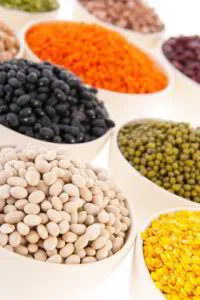Although it seems like a simple concept, the role of protein in our bodies and as a nutrient is often misunderstood. There is some debate today on whether North Americans consume too much or too little protein. On one hand, we always hear that we should decrease the amount of meat we eat, and that maybe a vegetarian diet is the best solution for a lot of the common health concerns seen today. On the other hand, there are certain weight loss diets that claim that high protein diets are the best way to lose weight. So who do we believe?
Protein requirements for an individual are calculated to be about 0.8 grams of protein per kilogram of body weight. That means that a 140 lb person should eat about 50 grams of protein per day. For athletes, growing kids, pregnant women, or others who expend more energy on a daily basis, the requirements can increase to 1g of protein per kilogram of body weight.
Why we need protein:
• Proteins are a part of many different parts of our body—skin, muscles, organs, blood, etc. They are also found in enzymes, immune molecules, and hormones.
• Protein is important in energy production, muscle contraction, and overall growth and development.
Based on the functions of protein in our body, it is pretty easy to see that protein can affect virtually every physiological system. As a result, inadequate protein can manifest in many different ways.
Some symptoms of inadequate protein intake include:
• Weight loss (and inability to lose weight)
• Fatigue and lethargy
• Headaches
• Poor wound healing (bruises, cuts, etc), frequent/prolonged illness
• Recurrent or nagging sports-related injuries
• Thinning or brittle hair and nails
• Protein deficiency has also been associated with symptoms of depression, anxiety, and mood changes.
Animal products generally have the highest amount of protein per serving. The difference between the sources of animal protein is that some contain more fat and cholesterol than others (ie. beef, lamb, duck, dark chicken meat). Those meats that are higher in saturated fat and cholesterol can have a negative impact on health. Beef, lamb, and duck should therefore be consumed less frequently. It is important to remember that one serving of meat (chicken, beef, pork, etc) is 4 ounces, or about the size of a deck of cards. This is considerably smaller than what the average person may consume at a restaurant. Here are some of the healthier animal protein choices:
• Eggs: 1 whole egg contains 6 grams of protein (4g is in the egg white)
• Chicken/turkey breast (skinless): 35g per 4 oz
• Salmon/halibut: 30g per 4 oz
While it is easier for those who eat animal products to meet protein requirements, it is not impossible for vegetarians to do the same—the key is to eat a combination of different plant proteins and to avoid becoming a “carbivore”.
Some Vegetarian Sources of Protein:
• Quinoa: 1 cup of cooked quinoa contains 8 grams of protein
• Almonds: 23 almonds contains 6 grams of protein
• Tofu: ½ cup has 8 grams of protein
• Tempeh: ½ cup has 15 grams of protein
• Beans such as chick peas, kidney beans, and lentils: 7-9 grams per ½ cup
It is important to keep in mind that your body can use only a limited amount of protein at a time. The best approach to ensuring you are eating adequate protein is to include a source of protein at every meal, in moderate proportions.

